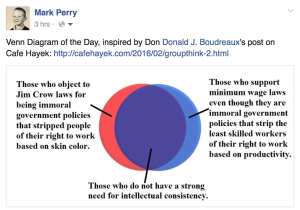On his Facebook page (but, at least so far, not at his excellent blog, Carpe Diem) Mark Perry captures nicely the essence of part of my recent post on the morality and economics of the minimum wage. Here’s Mark’s rendering of my point.

Relatedly, I ask another question of people such as Thomas Hutcheson who believe that the minimum wage is justifiable on ethical (and economic) grounds if, despite causing some workers in subgroup X (for example, “low-skilled workers”) to be unemployed, it raises the aggregate income earned by workers in subgroup X: Does it matter to you that my white, completely healthy, drives-his-own-car, upper-middle-class, private-school-educated, born-and-raised-in-wealthy-American-suburbia teenage son likely is paid, because of the minimum wage, a higher wage at work if his wage premium is the result of a policy that causes a disproportionate number of minority, inner-city teens from poor families to be unemployed? Do you think that if the minimum wage causes my son’s and 99 others like him to enjoy an aggregate increase in their collective annual income of, say $100,000 while at the same time this minimum wage causes, by shrinking the availability of jobs, the aggregate collective annual income of 100 inner-city minority teens to fall by only $95,000 that the minimum wage is shown by the data to be worthwhile economically and ethically, at least as far as this group of 200 low-skilled workers is concerned?



